《远大前程》英文赏析
- 格式:docx
- 大小:17.03 KB
- 文档页数:3
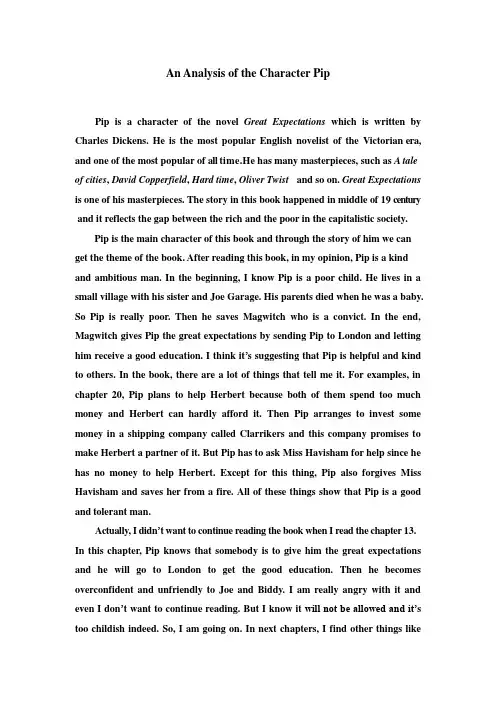
An Analysis of the Character PipPip is a character of the novel Great Expectations which is written by Charles Dickens. He is the most popular English novelist of the Victorian era, and one of the most popular of all time.He has many masterpieces, such as A tale of cities, David Copperfield, Hard time, Oliver Twist and so on. Great Expectations is one of his masterpieces. The story in this book happened in middle of 19 century and it reflects the gap between the rich and the poor in the capitalistic society.Pip is the main character of this book and through the story of him we can get the theme of the book. After reading this book, in my opinion, Pip is a kind and ambitious man. In the beginning, I know Pip is a poor child. He lives in a small village with his sister and Joe Garage. His parents died when he was a baby. So Pip is really poor. Then he saves Magwitch who is a convict. In the end, Magwitch gives Pip the great expectations by sending Pip to London and letting him receive a good education. I think it’s suggesting that Pip is helpful and kind to others. In the book, there are a lot of things that tell me it. For examples, in chapter 20, Pip plans to help Herbert because both of them spend too much money and Herbert can hardly afford it. Then Pip arranges to invest some money in a shipping company called Clarrikers and this company promises to make Herbert a partner of it. But Pip has to ask Miss Havisham for help since he has no money to help Herbert. Except for this thing, Pip also forgives Miss Havisham and saves her from a fire. All of these things show that Pip is a good and tolerant man.Actually, I didn’t want to continue reading the book when I read the chapter 13. In this chapter, Pip knows that somebody is to give him the great expectations and he will go to London to get the good education. Then he becomes overconfident and unfriendly to Joe and Biddy. I am really angry with it and even I don’t want to continue reading. But I know it will not be allowed and it’s too childish indeed. So, I am going on. In next chapters, I find other things likethis. In the chapter 16, Pip receives a letter from Biddy and it says Joe will come here. In general, when old friends give a visit to ours, we will be happy. But Pip concerns about Joe’ coming. And when Joe comes here, Pip is unfriendly to him. So, I think Pip also has bad aspects of his character.At last, I think Pip is also faithful to love. When Pip comes to Miss Havisham’s home and meets Estella, he fells in love with her. And then he changes his attitude to life. He wants to be a gentleman and get Miss Havisham’s admiration. In this way he can make Estella love him and finally marry her.These three points are my understanding of Pip. Anyhow, it’s a book to worth reading.。
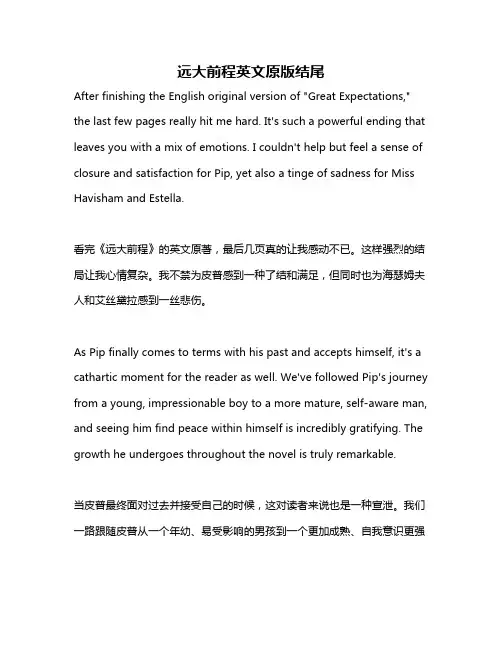
远大前程英文原版结尾After finishing the English original version of "Great Expectations," the last few pages really hit me hard. It's such a powerful ending that leaves you with a mix of emotions. I couldn't help but feel a sense of closure and satisfaction for Pip, yet also a tinge of sadness for Miss Havisham and Estella.看完《远大前程》的英文原著,最后几页真的让我感动不已。
这样强烈的结局让我心情复杂。
我不禁为皮普感到一种了结和满足,但同时也为海瑟姆夫人和艾丝黛拉感到一丝悲伤。
As Pip finally comes to terms with his past and accepts himself, it's a cathartic moment for the reader as well. We've followed Pip's journey from a young, impressionable boy to a more mature, self-aware man, and seeing him find peace within himself is incredibly gratifying. The growth he undergoes throughout the novel is truly remarkable.当皮普最终面对过去并接受自己的时候,这对读者来说也是一种宣泄。
我们一路跟随皮普从一个年幼、易受影响的男孩到一个更加成熟、自我意识更强的男子汉,看到他在自己内心找到平静是非常令人满足的。
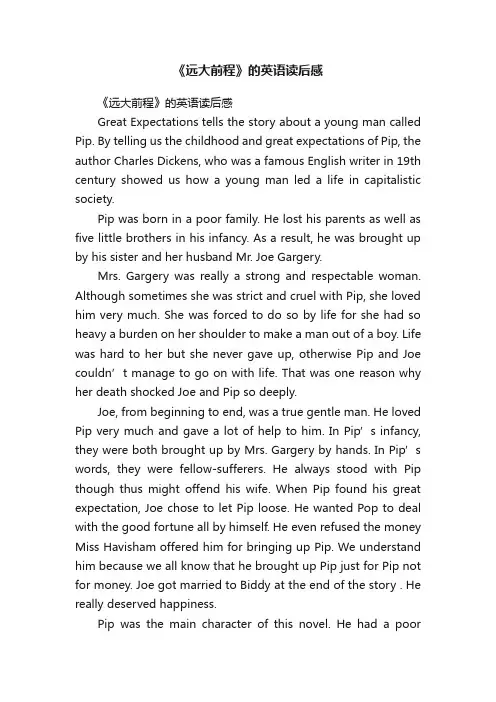
《远大前程》的英语读后感《远大前程》的英语读后感Great Expectations tells the story about a young man called Pip. By telling us the childhood and great expectations of Pip, the author Charles Dickens, who was a famous English writer in 19th century showed us how a young man led a life in capitalistic society.Pip was born in a poor family. He lost his parents as well as five little brothers in his infancy. As a result, he was brought up by his sister and her husband Mr. Joe Gargery.Mrs. Gargery was really a strong and respectable woman. Although sometimes she was strict and cruel with Pip, she loved him very much. She was forced to do so by life for she had so heavy a burden on her shoulder to make a man out of a boy. Life was hard to her but she never gave up, otherwise Pip and Joe couldn’t manage to go on with life. That was one reason why her death shocked Joe and Pip so deeply.Joe, from beginning to end, was a true gentle man. He loved Pip very much and ga ve a lot of help to him. In Pip’s infancy, they were both brought up by Mrs. Gargery by hands. In Pip’s words, they were fellow-sufferers. He always stood with Pip though thus might offend his wife. When Pip found his great expectation, Joe chose to let Pip loose. He wanted Pop to deal with the good fortune all by himself. He even refused the money Miss Havisham offered him for bringing up Pip. We understand him because we all know that he brought up Pip just for Pip not for money. Joe got married to Biddy at the end of the story . He really deserved happiness.Pip was the main character of this novel. He had a poorinfancy and always sreamt o f becoming rich. He happened to have helped a prisoner who had managed to escape from the prison and needed help badly. Pip might had never thought this would change his life and the prisoner would become。
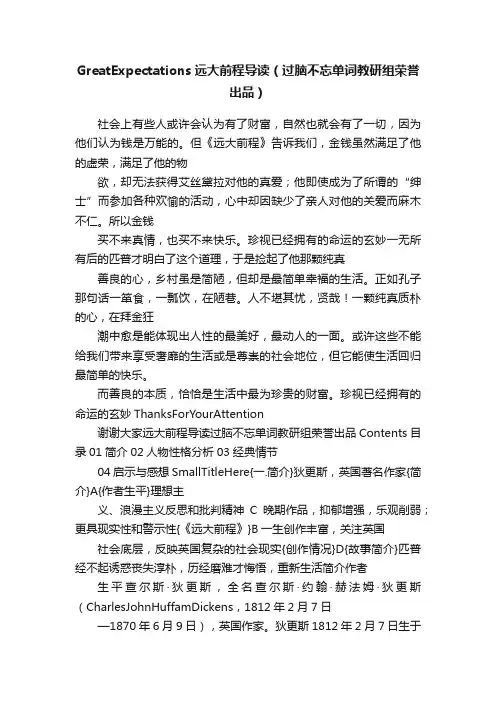
GreatExpectations远大前程导读(过脑不忘单词教研组荣誉出品)社会上有些人或许会认为有了财富,自然也就会有了一切,因为他们认为钱是万能的。
但《远大前程》告诉我们,金钱虽然满足了他的虚荣,满足了他的物欲,却无法获得艾丝黛拉对他的真爱;他即使成为了所谓的“绅士”而参加各种欢愉的活动,心中却因缺少了亲人对他的关爱而麻木不仁。
所以金钱买不来真情,也买不来快乐。
珍视已经拥有的命运的玄妙一无所有后的匹普才明白了这个道理,于是捡起了他那颗纯真善良的心,乡村虽是简陋,但却是最简单幸福的生活。
正如孔子那句话一箪食,一瓢饮,在陋巷。
人不堪其忧,贤哉!一颗纯真质朴的心,在拜金狂潮中愈是能体现出人性的最美好,最动人的一面。
或许这些不能给我们带来享受奢靡的生活或是尊崇的社会地位,但它能使生活回归最简单的快乐。
而善良的本质,恰恰是生活中最为珍贵的财富。
珍视已经拥有的命运的玄妙ThanksForYourAttention谢谢大家远大前程导读过脑不忘单词教研组荣誉出品Contents目录01简介02人物性格分析03经典情节04启示与感想SmallTitleHere{一.简介}狄更斯,英国著名作家{简介}A{作者生平}理想主义、浪漫主义反思和批判精神C晚期作品,抑郁增强,乐观削弱;更具现实性和警示性{《远大前程》}B一生创作丰富,关注英国社会底层,反映英国复杂的社会现实{创作情况}D{故事简介}匹普经不起诱惑丧失淳朴,历经磨难才悔悟,重新生活简介作者生平查尔斯·狄更斯,全名查尔斯·约翰·赫法姆·狄更斯(CharlesJohnHuffamDickens,1812年2月7日—1870年6月9日),英国作家。
狄更斯1812年2月7日生于朴次茅斯市郊,出生于海军小职员家庭,童年非常幸福,生活在富裕的中产阶级家庭中。
少年时(10岁)因家庭生活窘迫,只能断断续续入校求学。
后被迫到工场做童工。
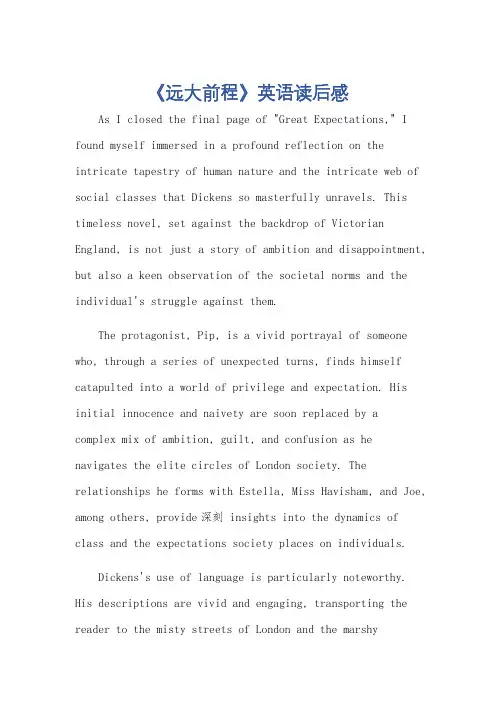
《远大前程》英语读后感As I closed the final page of "Great Expectations," I found myself immersed in a profound reflection on the intricate tapestry of human nature and the intricate web of social classes that Dickens so masterfully unravels. This timeless novel, set against the backdrop of Victorian England, is not just a story of ambition and disappointment, but also a keen observation of the societal norms and the individual's struggle against them.The protagonist, Pip, is a vivid portrayal of someone who, through a series of unexpected turns, finds himself catapulted into a world of privilege and expectation. His initial innocence and naivety are soon replaced by a complex mix of ambition, guilt, and confusion as he navigates the elite circles of London society. The relationships he forms with Estella, Miss Havisham, and Joe, among others, provide深刻 insights into the dynamics of class and the expectations society places on individuals.Dickens's use of language is particularly noteworthy. His descriptions are vivid and engaging, transporting the reader to the misty streets of London and the marshylandscapes of Kent. The narrative voice, often alternating between Pip's first-person perspective and omniscientthird-person, adds depth and dimension to the story,allowing the reader to experience Pip's emotional journey with him.The theme of expectations looms large in "Great Expectations." Pip's expectations of himself, others' expectations of him, and the societal expectations that shape his life are all explored through the lens of his relationships and experiences. The novel asks us toquestion what we expect from ourselves and others, and how these expectations shape our lives.My reading of "Great Expectations" was a rewarding journey through the complexities of human nature and society. It left me with a deeper understanding of the importance of examining and challenging our own expectations, not just of others but also of ourselves. The timeless lessons of this novel resonate strongly even today, reminding us that the true measure of a person's worth is not determined by their social status or materialpossessions, but by their character and the choices they make.**《远大前程》读后感**读完《远大前程》的最后一页,我沉浸在对人性复杂性和社会阶层交织的深刻反思中。
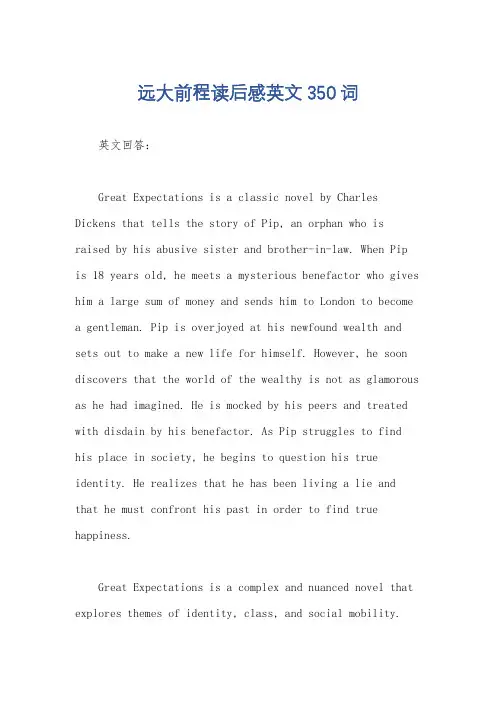
远大前程读后感英文350词英文回答:Great Expectations is a classic novel by Charles Dickens that tells the story of Pip, an orphan who is raised by his abusive sister and brother-in-law. When Pip is 18 years old, he meets a mysterious benefactor who gives him a large sum of money and sends him to London to become a gentleman. Pip is overjoyed at his newfound wealth and sets out to make a new life for himself. However, he soon discovers that the world of the wealthy is not as glamorous as he had imagined. He is mocked by his peers and treated with disdain by his benefactor. As Pip struggles to find his place in society, he begins to question his true identity. He realizes that he has been living a lie andthat he must confront his past in order to find true happiness.Great Expectations is a complex and nuanced novel that explores themes of identity, class, and social mobility.Dickens's writing is lyrical and evocative, and his characters are unforgettable. The novel is a timelessclassic that continues to resonate with readers today.中文回答:《远大前程》是查尔斯·狄更斯创作的一部经典小说,讲述了一个名叫皮普的孤儿的成长故事。
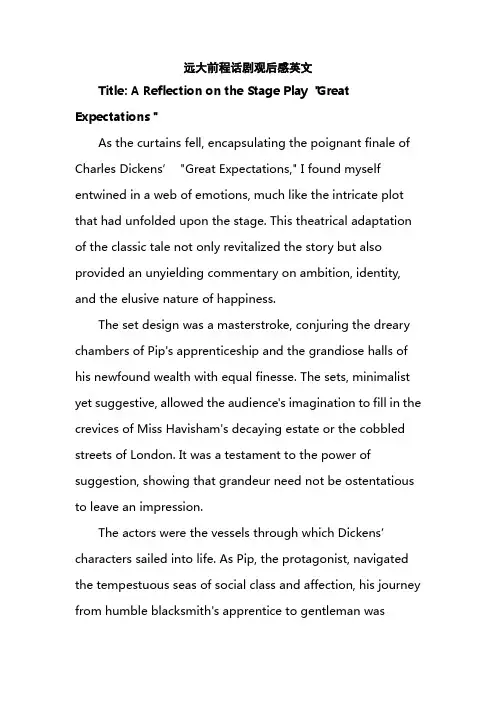
远大前程话剧观后感英文Title: A Reflection on the Stage Play "Great Expectations"As the curtains fell, encapsulating the poignant finale of Charles Dickens’"Great Expectations," I found myself entwined in a web of emotions, much like the intricate plot that had unfolded upon the stage. This theatrical adaptation of the classic tale not only revitalized the story but also provided an unyielding commentary on ambition, identity, and the elusive nature of happiness.The set design was a masterstroke, conjuring the dreary chambers of Pip's apprenticeship and the grandiose halls of his newfound wealth with equal finesse. The sets, minimalist yet suggestive, allowed the audience's imagination to fill in the crevices of Miss Havisham's decaying estate or the cobbled streets of London. It was a testament to the power of suggestion, showing that grandeur need not be ostentatious to leave an impression.The actors were the vessels through which Dickens’characters sailed into life. As Pip, the protagonist, navigated the tempestuous seas of social class and affection, his journey from humble blacksmith's apprentice to gentleman wasemblematically portrayed. His evolution, both externally in attire and demeanor, and internally in his understanding of true friendship and love, was a sight to behold. The actor played his role with such nuance that one could almost feel the conflict raging within him as he reconciled his affections for the mercurial Estella and the steadfast Joe.Estella, the living embodiment of beauty and cruelty, was another character brought vividly to life. Her performer captured the character’s icy exterior and tortured interior with such finesse that the character's journey from heartless to heartbroken seemed inevitable yet poignant.However, it was not just the central performances that shone. The ensemble cast painted a vivid picture of Victorian society, each character a brushstroke in the larger portrait. From Magwitch's tortured redemption to Herbert Pocket's genial companionship and Miss Havisham's tragic vengefulness, every role was charged with significance, contributing to the tapestry of human experience that is "Great Expectations."Dickens' timeless exploration of identity and morality was given new life under the play's modern lens. The juxtaposition of Pip's longing for higher status against his eventualrealization of the superficiality of social standing spoke volumes about our own contemporary pursuit of success. In this light, the play functioned as both a mirror and a window —reflecting society's age-old grapple with status while offering a glimpse into the potential consequences of unchecked ambition.In essence, the stage play "Great Expectations" was an emotionally resonant work that successfully married the original narrative's depth with contemporary relevance. It reminded us that while our outer circumstances may change, the core of our being—our values and our treatment of others —defines our true character. As the lights dimmed, I exited the theater with a sense of having witnessed not just a play, but a profound examination of the human condition, one that echoed long after the curtains closed.。
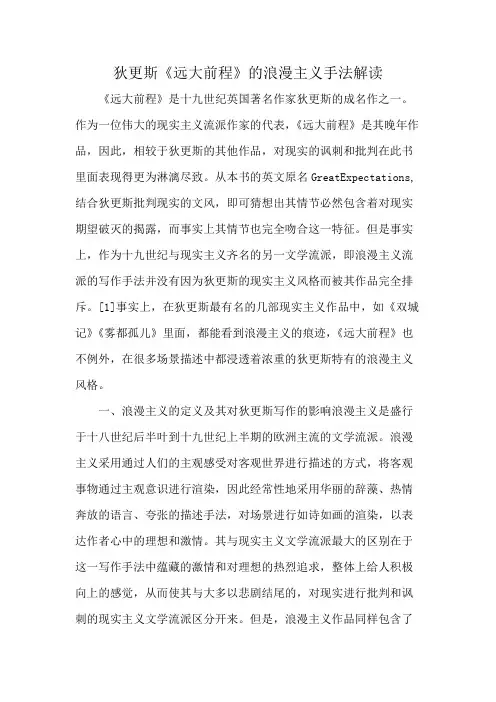
狄更斯《远大前程》的浪漫主义手法解读《远大前程》是十九世纪英国著名作家狄更斯的成名作之一。
作为一位伟大的现实主义流派作家的代表,《远大前程》是其晚年作品,因此,相较于狄更斯的其他作品,对现实的讽刺和批判在此书里面表现得更为淋漓尽致。
从本书的英文原名GreatExpectations,结合狄更斯批判现实的文风,即可猜想出其情节必然包含着对现实期望破灭的揭露,而事实上其情节也完全吻合这一特征。
但是事实上,作为十九世纪与现实主义齐名的另一文学流派,即浪漫主义流派的写作手法并没有因为狄更斯的现实主义风格而被其作品完全排斥。
[1]事实上,在狄更斯最有名的几部现实主义作品中,如《双城记》《雾都孤儿》里面,都能看到浪漫主义的痕迹,《远大前程》也不例外,在很多场景描述中都浸透着浓重的狄更斯特有的浪漫主义风格。
一、浪漫主义的定义及其对狄更斯写作的影响浪漫主义是盛行于十八世纪后半叶到十九世纪上半期的欧洲主流的文学流派。
浪漫主义采用通过人们的主观感受对客观世界进行描述的方式,将客观事物通过主观意识进行渲染,因此经常性地采用华丽的辞藻、热情奔放的语言、夸张的描述手法,对场景进行如诗如画的渲染,以表达作者心中的理想和激情。
其与现实主义文学流派最大的区别在于这一写作手法中蕴藏的激情和对理想的热烈追求,整体上给人积极向上的感觉,从而使其与大多以悲剧结尾的,对现实进行批判和讽刺的现实主义文学流派区分开来。
但是,浪漫主义作品同样包含了其他一些主要特点,包括对卢梭提倡的“回归自然”的向往,注重主观对客观的感受,以及对儿童命运的关注和儿童形象的塑造等。
狄更斯作为十九世纪中叶英国最有名的现实主义文学家,其所处的时代必然深受同时期盛行的浪漫主义文学流派的影响。
在狄更斯的笔下,主要通过对小资产阶级在现实中奋斗经历的刻画,对当时的资本主义社会进行深刻的讽刺,并没有浪漫主义所具有的昂扬的激情以及对理想热烈的追求。
但是,在其对具体场景的描写中,却经常性地采用浪漫主义手法,通过自己的主观感受来观察外在环境,通过对场景的主观渲染,烘托其中的气氛,给人以身临其境的感受,从而产生强烈的共鸣。
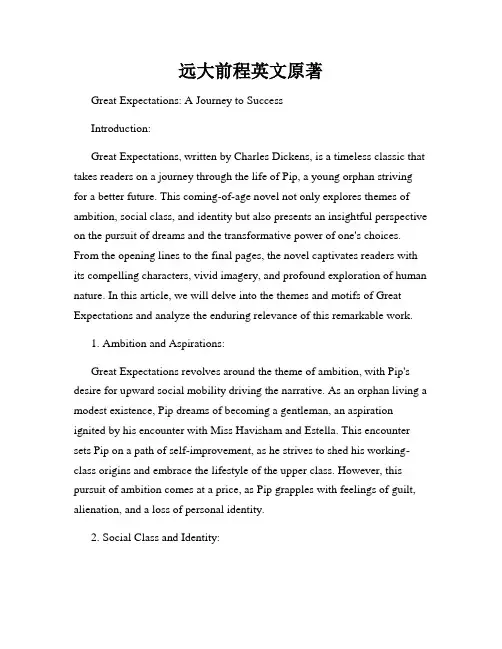
远大前程英文原著Great Expectations: A Journey to SuccessIntroduction:Great Expectations, written by Charles Dickens, is a timeless classic that takes readers on a journey through the life of Pip, a young orphan striving for a better future. This coming-of-age novel not only explores themes of ambition, social class, and identity but also presents an insightful perspective on the pursuit of dreams and the transformative power of one's choices. From the opening lines to the final pages, the novel captivates readers with its compelling characters, vivid imagery, and profound exploration of human nature. In this article, we will delve into the themes and motifs of Great Expectations and analyze the enduring relevance of this remarkable work.1. Ambition and Aspirations:Great Expectations revolves around the theme of ambition, with Pip's desire for upward social mobility driving the narrative. As an orphan living a modest existence, Pip dreams of becoming a gentleman, an aspiration ignited by his encounter with Miss Havisham and Estella. This encounter sets Pip on a path of self-improvement, as he strives to shed his working-class origins and embrace the lifestyle of the upper class. However, this pursuit of ambition comes at a price, as Pip grapples with feelings of guilt, alienation, and a loss of personal identity.2. Social Class and Identity:Through the lens of Pip's journey, Dickens confronts the rigid social hierarchy of Victorian England. The novel exposes the stark divisions between the upper and lower classes, as well as the difficulties and prejudices faced by those seeking to transcend their social status. Pip's transformation into a gentleman highlights the tension between his newfound status and his humble roots, leading to a crisis of identity. The exploration of social class not only provides a critique of Victorian society but also raises questions about the nature of identity and the importance of remaining true to oneself.3. Redemption and Forgiveness:Great Expectations also delves into the themes of redemption and forgiveness, particularly through the character of Magwitch. Initially portrayed as a fearsome criminal, Magwitch's acts of kindness and paternal love towards Pip challenge societal prejudices and notions of goodness. Through Pip's relationship with Magwitch, the novel explores the transformative power of forgiveness and the potential for personal growth and emotional redemption.4. Love and Heartbreak:The presence of unrequited love and heartbreak permeates the narrative, adding layers of complexity to the central relationships portrayed in the novel. Pip's infatuation with Estella and his longing for her affection propel the storyline forward, highlighting the destructive nature of unattainable love. The portrayal of Miss Havisham's jilted bride persona further emphasizes the detrimental effects of heartbreak and the lasting scars it can leave on individuals.Conclusion:Great Expectations continues to captivate readers with its timeless themes and vivid characters. The novel's exploration of ambition, social class, identity, redemption, and love offers valuable insights into the human condition, transcending the boundaries of time and place. Through Pip's journey towards self-discovery and self-realization, Charles Dickens masterfully provokes thought and reflection on the pursuit of dreams, personal growth, and the importance of maintaining one's integrity amidst societal pressures. Great Expectations truly deserves its status as a literary masterpiece that resonates with readers around the world, inspiring them to dream big and embark on their own journey to success.。
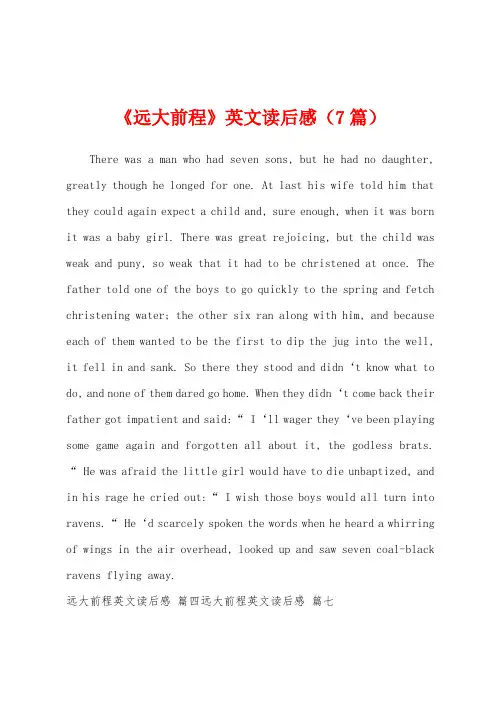
《远大前程》英文读后感(7篇)There was a man who had seven sons, but he had no daughter, greatly though he longed for one. At last his wife told him that they could again expect a child and, sure enough, when it was born it was a baby girl. There was great rejoicing, but the child was weak and puny, so weak that it had to be christened at once. The father told one of the boys to go quickly to the spring and fetch christening water; the other six ran along with him, and because each of them wanted to be the first to dip the jug into the well, it fell in and sank. So there they stood and didn‘t know what to do, and none of them dared go home. When they didn‘t come back their father got impatient and said:“ I‘ll wager they‘ve been playing some game again and forgotten all about it, the godless brats.“ He was afraid the little girl would have to die unbaptized, and in his rage he cried out:“ I wish those boys would all turn into ravens.“ He‘d scarcely spoken the words when he heard a whirring of wings in the air overhead, looked up and saw seven coal-black ravens flying away.远大前程英文读后感篇四远大前程英文读后感篇七Great Expectations is a novel by Charles Dickens, a famous writer from England. It is the story of the orphan Pip’s life. The character in this novelgaveme the deep impression was Pip.He fell in love with Estella. Educating himself for the girl,Pip studied as hard as he could. Why did he love Estella so much? Not for her beautiful face,her treasure 。
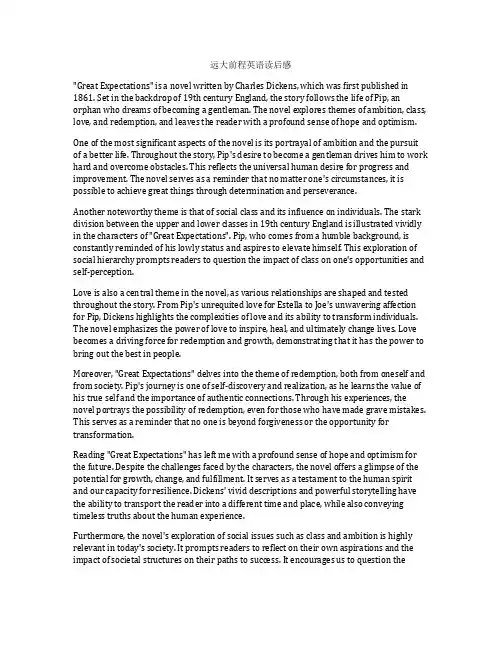
远大前程英语读后感"Great Expectations" is a novel written by Charles Dickens, which was first published in 1861. Set in the backdrop of 19th century England, the story follows the life of Pip, an orphan who dreams of becoming a gentleman. The novel explores themes of ambition, class, love, and redemption, and leaves the reader with a profound sense of hope and optimism. One of the most significant aspects of the novel is its portrayal of ambition and the pursuit of a better life. Throughout the story, Pip's desire to become a gentleman drives him to work hard and overcome obstacles. This reflects the universal human desire for progress and improvement. The novel serves as a reminder that no matter one's circumstances, it is possible to achieve great things through determination and perseverance.Another noteworthy theme is that of social class and its influence on individuals. The stark division between the upper and lower classes in 19th century England is illustrated vividly in the characters of "Great Expectations". Pip, who comes from a humble background, is constantly reminded of his lowly status and aspires to elevate himself. This exploration of social hierarchy prompts readers to question the impact of class on one's opportunities and self-perception.Love is also a central theme in the novel, as various relationships are shaped and tested throughout the story. From Pip's unrequited love for Estella to Joe's unwavering affection for Pip, Dickens highlights the complexities of love and its ability to transform individuals. The novel emphasizes the power of love to inspire, heal, and ultimately change lives. Love becomes a driving force for redemption and growth, demonstrating that it has the power to bring out the best in people.Moreover, "Great Expectations" delves into the theme of redemption, both from oneself and from society. Pip's journey is one of self-discovery and realization, as he learns the value of his true self and the importance of authentic connections. Through his experiences, the novel portrays the possibility of redemption, even for those who have made grave mistakes. This serves as a reminder that no one is beyond forgiveness or the opportunity for transformation.Reading "Great Expectations" has left me with a profound sense of hope and optimism for the future. Despite the challenges faced by the characters, the novel offers a glimpse of the potential for growth, change, and fulfillment. It serves as a testament to the human spirit and our capacity for resilience. Dickens' vivid descriptions and powerful storytelling have the ability to transport the reader into a different time and place, while also conveying timeless truths about the human experience.Furthermore, the novel's exploration of social issues such as class and ambition is highly relevant in today's society. It prompts readers to reflect on their own aspirations and the impact of societal structures on their paths to success. It encourages us to question thesystems and structures that define our lives, and to strive for a more just and equitable society.In conclusion, "Great Expectations" is a powerful testament to the human spirit, the pursuit of dreams, and the capacity for redemption. Its themes of ambition, class, love, and redemption resonate deeply with readers, and leave them with a profound sense of hope and optimism. Reading this novel has been an enriching experience that has challenged my own beliefs and worldview. It serves as a reminder that no matter our circumstances, we have the power to shape our own destinies and create a future filled with promise and possibility.。
Great,Expectations英文读后感(远大前程)篇一:英文原著阅读报告 great expectations 远大前程Great ExpectationsIntroductionThe novel I read this time is “Great Expectations”written by Charles Dickens(1812-1870). He is the greatest representative of English critical realism. Dickens was bornin a poor family. At the age of 12, his father was put in prison and young Dickens was sentto work in a factory. From 1827 to 1829, Dickens worked as a clerk in a low firm and lateras a newspaper reporter. Dickens was horned by the Queen of England three months beforehis death on June 9, 1810. The words of his grave read as follows “by his death, one ofEngland’s greatest writers is lost to the world.”He has many masterpieces, such as “A tale ofcities”“David Copperfield”“Hard time”“Oliver Twist” and so on. “Great Expectations”is one of his masterpieces. The story in this book happened in middle of 19 century and itreflects the gap between the rich and the poor in thecapitalistic society.The summary of the bookThis story tells us about a young man who wished for the ueal/imaginary lives, andeventually his hope was extinguished by the real life. Pip was an unfortunate boy. Hisparents both died when he was a baby. He was brought up by his elder sister and herhusband Joe Gargery. Joe was kind to Pip and he also wanted Pip to be a good blacksmith.But the emergence of Estella has changed his life. He fell in love with Estella and he wantedto be a gentleman for her. Then a mysterious person came to help him to realize his greatexpectations. At first Pip thought that it was Miss Havisham, a strange woman made plansfor him. But at last, it proved that an escaped convict who he had helped when he was alittle boy was his benefactor. When the escaped convict was arrested again, his expectationswere at an end. Finally he realized that he only wanted to be a gentleman but he had ignoredhis old friends. He came to the real life again eventually. After suffering so many pains heand Estella came together at last.My view on this story “Great Expectations”, I think there is an irony included in this title. It relates to some uealistic dreams. From this novel, I have learnt a lot.Firstly, I pick up several lessons from Pip. One can have great dreams, but we should achieve our dreams by our own effort instead of depending on other people. In this story, Pip had an uealistic dream. He didn’t want to be a poor blacksmith like Joe. He wanted to be upper class people, to be a gentleman and he imagined that there was someone had made a plan for him. It is true that Abel Magwitch helped him secretly. But when Abel Magwitch was arrested, it put an end to Pip’s great expectations. He had nothing left. And in this book, Herbert and Pip form a poignant contrast. Herbert made great efforts to realize his dreams. In the end, his business was doing well, and his company had offices overseas. Therefore, we should realize that if we want to achieve something or fulfill one of our ambitions, we must make efforts by ourselves. There is no one in the world that makes plans for us. And there is no short cut for success.Secondly, I have learned from Pip’s experience that we should be grateful to others. We know that Pip wasbrought up by his sister and Joe. And Biddy was also friendly to him when he was at home. But when he was helped by a mysterious person, he moved to London to learn being a gentleman. He began to be proud and look down upon those people at home. He wanted to forget his poor life and his poor friends. But when his “great expectations” were ruined, it was still those people who helped him out of trouble. However, when he began to realize it, his sister has died; it was too late to say thanks to her. What I want to say is that no matter how successful we are, we should not be proud; we should not forget the people who had helped us, and return for them. If I have learned anything about giving thanks, it is this: give it now .Don’t hesitate until it is too late to give our thanks.Thirdly, I also learn some lessons from Miss Havisham, She is a woman full of hatred, and she lived in hatred for so many years. She brought Estella up in order to revenge on man. I think what she did is not worth at all. On one hand, she was not in real happiness, although she revenged on other people. On the other hand, she had ruined Estella’s life. In addition, she also made other men miserable. As for as I’m concerned, if I was Miss Havisham, I will choose another differentkind of life. I will make myself live better than before to prove that I can live better without that man. From her experience, I think we should learn to forgive, learn to give up some bad things that had happened. No matter what had happened in the past, we should not be always lost in the past and we are supposed to look forward, and continue our new life. There is no doubt that if she had chosen a positive way, she will have a satisfactory life.What’s more, when it comes to Estella, I want to say that we should live our own life, and do not only live up to others’ expectations. We know that, Estella was brought up by Miss Havisham to revenge on man. She did everything that Miss Havisham told her. We can say that she was “made” by Miss Havisham, and she was proud, cold. At last, following Miss havisham’s requirements she married to a man she didn’t love at all. I think she lived an unhappy life. She only did as other people told her. And she didn’t do something what she liked.I think this kind of life is meaningless. We should have our freedom. It occurred to me that nowadays, parents have high expectations on their children. They decide so many things for their children without getting their children’s permission. I think children should havetheir choice of life. Parents should not put their children into cage. It is wise for them to set their children free to look for their own sky.In a word, from this book, I have learnt how to be myself, how to realize my dreams and how to live my own life.篇二:《远大前程》英文读后感The book review of Great ExpectationsRecently, I have finished reading Great Expectations, which is widely considered as themasterpiece of Dickens. The historic background of this book is Victorian Period which was the time when British was governed by Queen Victoria. The hero of the book is Pip, who was living in a blacksmith family. Someday, he met Magwitch, who was a convict, and he helped him. To show his gratitude, Magwitch gave Pip a good fortune and Pip led a totally different life after he got the money. However, Pip lost all of his money and fame because of his enemies’ plot at the last and become ordinary people at the last.Dickens is famous for his novel such as Great Expectations, the Tale of Two Cities, Oliver Twist and so on. He always creates some people in lower class and show their different qualities. In Great Expectations,he tried to show us the conflict between different classes in VictorianPeriod by telling us the story of Pip. After Pip got the money, he left his friends and family to city, and then he learned to raise his social state. However, he was a child born in a blacksmith family and there’s a wide gap between him and the upper class. Finally, he lost all of his greatexpectations and went back to his hometown as ordinary people. Fortunately, he met his lover, Estella, in Satis House and they left there together at the end of the story.In the book, my favorite character is Joe, Pip’s brother in law. He was a blacksmith and belonged to the lower social class. However, he possessed some good qualities that made him noble. For example, though Joe didn’t know any word, he thought highly of Pip when Pip tried to write him a letter. What’s more, Pip’s sister always considered Pip as the burden of their family but Joe always believed that his brother can become successful. No matter how unkindly he was treated, Joe was always family to others. Undoubtedly, it’s Joe’s noble quality that prevents Pip from becoming someone snobbish.In my opinion, the story of Pip is really attractive while the writing style is also special. For example, Dickens used simile and metaphor for many times in his book. When Joe visited Pip, Dickens wrote that Joe had taken his hat as a bird’s nest with egg in. I think it’s hard to show the inner world of characters as well as feeling because those things are really abstract. On the other hand, if we write it directly, that may be boring and childish. And by using simile, Dickens transforms the abstract feeling into visual language, with which we can use our imagination to enjoy the story much more easily. I think that we can also make good use of Dickens’s outstanding skills to improve our writing.After reading “Great Expectations”, many people complained that the class difference will always result in tragedy and they think that we should try to destroy those barriers. However, I think the massage that Dickens wants to deliver is that we should always be friendly,warm-hearted and optimistic. With these qualities, we can always lead a happy and comfortable life like Joe even though we don’t have much money.《Great,Expectations英文读后感(远大前程)》。
【导语】《远⼤前程》⼜译《孤星⾎泪》,是英国作家查尔斯·狄更斯晚年写成的教育⼩说。
故事背景为1812年耶诞节前⼣⾄1840年冬天,主⾓孤⼉⽪普(Pip)以⾃传式⼿法,叙述从7岁开始的三个⼈⽣阶段。
以下是为⼤家精⼼整理的《远⼤前程》英⽂读后感,欢迎⼤家阅读。
【篇⼀】《远⼤前程》英⽂读后感 With so many famous masterpieces on the booklist, it is really a pretty hard job to choose one to read first. After much hesitation and deeply thought, I finally decided to borrow Great Expectations from the small library. Great Expectations is about love, family, and rejection as Pip and Miss Havisham have both been rejected in certain ways. Pip is a boy around 13 years old, easy to fright, and goes through his life suffering lots of sadness. He is in love with a girl named Estella and wants her to find his love, but for him being shy and not showing himself to her, it makes it very hard for him. Great Expectations was the penultimate novel completed by the most popular novelist of Victorian England, Charles Dickens. Born in Kent, England, in 1812 to a family of modest means but great pretensions, Dickens’s early life was marked by both humiliation and ambition. Dickens never forgot the period of financial crisis during his childhood, when following his father’s bankruptcy, he was taken out of school and forced to work in a shoepolish warehouse. Pip meets an escaped convict, Magwitch, and gives him food, in an encounter that is to haunt both their lives. When Pip receives riches from a mysterious benefactor he snobbishly abandons his friends for London society andhis“great expectations”。
The great expectation of Pip and Magwitch
We all know that chapter 39 is the turning point of the whole novel. Pip
knows that his sponsor is not Miss Havisham, but the escaped prisoner
Magwitch, who is saved by Pip. This truth makes Pip’s great expectation
shattered. From the context, we can see that “the great expectation” is a
kind of ambition from both Pip and Magwitch. It is such an ambition that
hold up the life of both two people and bring a lot of change to their
character. And the ambition is also the indication of one’s life.
First, let’s see Pip’s ambition. Although the text don’t illustrate it clearly,
we can infer from several details. At the beginning of the text, Pip states
that “I had a taste for reading, and read regularly so many hours a day.”
This state can fully demonstrate that Pip has a strong eager to learn
knowledge, which means that he wants to become a real gentleman in
the upper class. And when Pip is told that his benefactor is Magwitch,
rather than Miss Havisham. He is shocked, disappointed as well as
heart-broken. He repeats “Estella, Estella”, which tells us that his
intention to become a gentleman was because of Estella, he wants to be
able to match with her. From the above, we can conclude that Pip’s
ambition is to be a gentleman and get access to Estella.
The great expectation describes not only Pip’s ambition, but also other
people’s ambition, including that blacksmith Joe’s, Pip’s friend Herbert
and his benefactor Magwitch’s.
Let’s take Magwitch’s ambition in the text for example. I think his is
rather complicated than Pip’s. There are two mainly ambitions: one is
that he wants to repay Pip for saving his life, another is that he wants to
show his greatness for making a little boy into a gentleman in upper class,
which is also a kind of dissatisfaction to the society. Just as he mentioned
in the text, “ I tell it, fur you to know as that there hunted dunghill dog
wot you kept life in, got his head so high that he could make a
gentleman”. The society treat him as a nasty dog and he is looked down
upon those people in the upper class. But he has an ability to turn a
village boy into a gentleman, and he thinks himself is nobler and greater
than those people. He uses his action to satirize them.
The ambition in people’s heart is like a guiding light in their way. As one’s
ambition changes, people’s behavior may change accordingly and
unconsciously. Pip studies hard in order to get access to Estella. But at
the same time, bad characters like selfishness and mammonism arises
from him. In the front part of the text, when Pip sees Magwitch, he pays
attention to his clothing first and emphasizes his substantially dress, but
roughly. Suppose if Magwitch is not well-dressed and looks like poor just
as the first time they meet, will Pip accept him and let him in? When Pip
recognized Magwitch, his astonishment is more than his pleasance and
he supposes there will be no connection between them. Why Pip
becomes so indifferent? It is because of the “different circumstances” he
mentioned in the text. The circumstances that he is an upper class
member now and he cannot have any connection with underclass
people, let alone an escaped prisoner. Between social class and old
relationship, he chooses social class. We can say that it is money that
tempts him and makes him indifferent, or the money distorts his
ambition, which misleads his behavior.
To conclude, I think Pip is more misfortunate than any other people. It is
not because he is an orphan or he lost his money in the end, it is because
he is treated as a tool by other people, unknowingly. He is treated as a
money machine by his sister when he is little, and he is played by Estella
as a tool to please Miss Havisham. Later, although being endowed with a
large fortune, Pip is indeed an example who is made by Magwitch to
manifest his greatness and to revenge to the world. Pip’s great
expectation is made by Miss Havisham, Estella, Magwitch and himself,
and ruined by them.